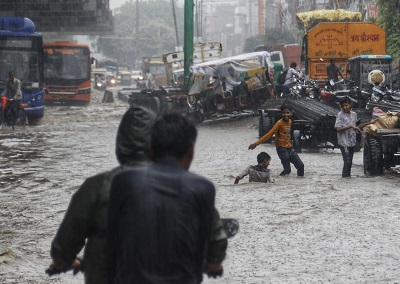New Delhi, (Asian independent) The Delhi High Court on Tuesday called upon the Chief Secretary and Finance Secretary of the city government to appear virtually and elucidate their strategy for addressing water-logging in the national capital.
In the previous heating, the court of Acting Chief Justice Manmohan and Justice Manmeet P.S. Arora had expressed dismay at the collapse of the drainage system, stressing the severity of the situation.
Highlighting the issue during a hearing on suo motu petitions addressing water-logging problems and rainwater harvesting in Delhi, the bench had pointed out instances of flooding in newly constructed areas.
On Tuesday, the court stressed the need for an explanation on whether a drainage master plan has been formulated to combat the challenges posed by heavy monsoon rains.
Observing that numerous residential areas experience sewage backflow during monsoons and noting the lack of segregation between stormwater drains and sewage-carrying drains in Delhi, the court expressed concerns over choked drains filled with silt and inadequately- constructed drainage systems.
The bench directed the officials to virtually appear before the court on January 30 for the next hearing.
Moreover, they were asked to provide a concise presentation outlining their approach to tackle water-logging and the status of the drainage master plan, including its implementation progress.
The court had last time criticised the capital’s drainage system, describing it as absolutely pathetic and in a very bad state of affairs. The judges had questioned the efficacy of the drainage system, noting that even with advanced technologies, these areas faced water-logging. It has cited specific cases of water-logging in New Delhi, recounting complaints of fishes entering drawing rooms during monsoons and even a snake found inside a bungalow due to flooding.
The court spoke about the broken sewage lines at prominent locations like ITO, near the Delhi Zoo, and near the high court itself, underscoring the callousness of authorities. Expressing frustration with the lack of a common verified plan for the drainage system, the court had said that the annual sight of the Minto Bridge submerged in water during monsoons highlighted the city’s drainage challenges.
It had admonished authorities for their negligence, stating, “Things are very very bad, and you agencies cannot be tamed by anyone.” Urging immediate action, the court had directed authorities to treat the situation as a “wake-up call” and commence work promptly, rather than waiting for the monsoon season.
The judges had stressed the need for clear instructions and criticised the practice of sweepers dumping garbage into drains without proper guidelines. The court had urged the lawyers representing the involved agencies to engage in a “brainstorming session” with authorities to propose viable solutions. Parties such as the Centre, Delhi government, Municipal Corporation of Delhi, Delhi Police, and other relevant bodies are parties to the petitions, reflecting the wide-ranging concern over the city’s drainage woes.









